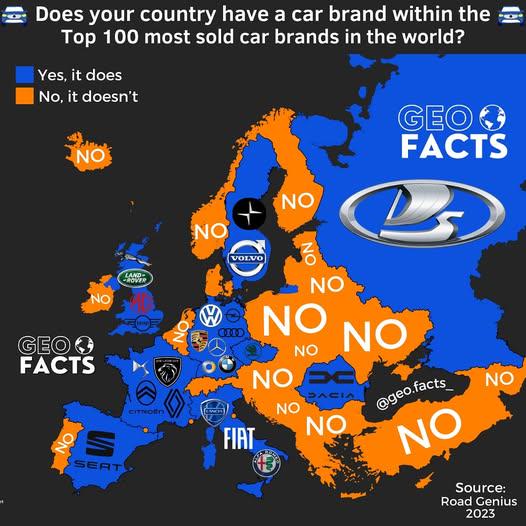Car Brands in the Top 100 Map


Marcus Rodriguez
Historical Geography Expert
Marcus Rodriguez specializes in historical cartography and geographic data analysis. With a background in both history and geography, he brings unique...
Geographic Analysis
What This Map Shows\nThis map provides a visual representation of countries that have car brands listed among the top 100 most sold car brands in the world. By examining this map, one can quickly identify which nations are home to significant automotive manufacturers and how these brands contribute to the global market. It’s a fascinating reflection of not only the automotive industry but also the economic landscape of various countries.
Deep Dive into Global Automotive Brands\nThe automotive industry is a colossal sector that influences economies around the globe. With millions of vehicles sold each year, understanding which countries host the world’s leading car brands allows us to appreciate the dynamics of global trade and consumer preferences.
Interestingly, the countries with established automotive sectors, such as Japan, Germany, and the United States, dominate the rankings. Companies like Toyota, Volkswagen, and Ford have become household names, synonymous with quality and innovation. For instance, Toyota alone has consistently ranked as one of the top-selling car brands worldwide, known for its reliable and fuel-efficient vehicles. In 2022, Toyota sold over 10 million vehicles, underscoring its stronghold in the market.
Emerging markets are also making their mark. Countries like China have rapidly developed their automotive industries, boasting brands like Geely and BYD, which are climbing the ranks of global sales. In fact, data from 2022 highlighted that China became the largest automotive market, with over 25 million vehicles sold, showcasing its burgeoning domestic brands.
Furthermore, the rise of electric vehicles (EVs) is reshaping the landscape. Companies like Tesla from the United States and BYD from China are leading the charge in this sector, reflecting a significant shift in consumer preferences towards sustainability. As the world moves towards greener alternatives, the presence of a country’s car brands in the top 100 may soon heavily rely on their ability to innovate in the EV space.
Regional Analysis\nWhen examining the map by region, several patterns emerge. In North America, the U.S. remains a powerhouse with brands like Ford, General Motors, and Tesla. Interestingly, despite the dominance of American brands, the market is also seeing increased competition from foreign manufacturers, especially from Japan and Germany.
In Europe, German brands such as Volkswagen, BMW, and Mercedes-Benz illustrate the region’s commitment to luxury and performance vehicles. The competition is fierce, with European manufacturers often leading in technology and innovation. However, the market is also becoming increasingly crowded with new entrants focusing on electric vehicles.
Asia, particularly East Asia, presents a slightly different picture. Japan continues to be a significant player with brands like Honda and Nissan, while South Korea has made notable advances through Hyundai and Kia. The shift towards electric vehicles is also evident here, with several manufacturers investing heavily in EV technology.
Meanwhile, Latin America presents a unique scenario. While countries like Brazil and Mexico have local manufacturers, they often serve more regional markets and tend to lag behind in global sales rankings. However, they are critical players in the supply chain for larger automotive companies, especially in terms of assembly and parts manufacturing.
Significance and Impact\nUnderstanding the presence of car brands within the top 100 most sold globally holds significant implications. This reflects not only economic vitality but also consumer behavior trends and technological advancements. The automotive industry is a key driver of employment and innovation, making it vital for national economies.
As we look towards the future, the trends suggest that the automotive landscape will keep evolving. With the increasing focus on sustainability, countries that adapt to electric vehicle production are likely to see their brands rising in the rankings. Moreover, geopolitical factors, trade agreements, and international relations can greatly influence the automotive market, given its global nature.
The shift towards EVs not only affects manufacturers but also has broader implications for energy consumption, urban planning, and environmental policies worldwide. As countries strive to meet climate goals, the automotive industry will be at the forefront of this transition. Thus, keeping an eye on which nations have brands in the top 100 will provide insights into future economic trends and technological advancements within the global market.
Visualization Details
- Published
- August 24, 2025
- Views
- 80
Comments
Loading comments...